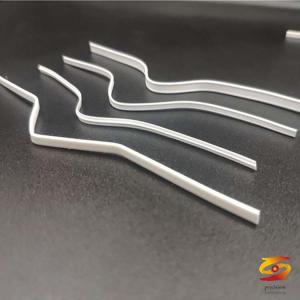Rigid PVC basic knowlege
Rigid PVC basic knowlegeRigid polyvinyl chloride, UPVC is also called rigid PVC. It is an amorphous thermoplastic resin made by polymerization of vinyl chloride monomer plus certain additives (such as stabilizer, lubricant, filler, etc.). But strictly speaking UPVC is hard PVC, but hard PVC is not UPVC. UPVC should be rigorous and scientifically discussed. UPVC should not contain or use plasticizers, while hard PVC contains plasticizers.
Chinese name rigid PVC, foreign name UPVC, also known as rigid PVC, other thermoplastic resin
table of Contents
1 Introduction
2 Differences between Chinese and foreign definitions
3 Production and application
4 Modified varieties
5 Features and applications
Introduction
In addition to additives, blending and modification methods with other resins are also adopted, which makes it have obvious practical value. These resins include CPVC, PE, ABS, EVA, MBS, etc.
UPVC has a high melt viscosity and poor fluidity. Even if the injection pressure and melt temperature are increased, the change in fluidity is not large. In addition, the molding temperature of the resin is very close to the thermal decomposition temperature, and the temperature range in which the molding can be performed is very narrow, which is a material that is difficult to mold.
The difference between Chinese and foreign definitions
The understanding of rigid pvc is completely different in China and abroad. Foreign interpretation of rigid pvc is equivalent to UPVC or PVCU, that is to say, the hardness is above SHORE D 80, unplasticized PVC modified materials; while domestic understanding of rigid pvc is plasticizer within 20 parts of pvc The modified material is actually a semi-soft and hard PVC modified material, and its hardness can be measured by SHORE A or SHORE D, while UPVC can only be measured by SHORE D is accurate and standardized.
Production and application
Polyvinyl chloride is polymerized by vinyl chloride monomer (VCM). Because 57% of its molecular mass is elemental chlorine. Therefore, compared with other plastics, it consumes less oil in the same quality. However, because this plastic has a relatively high density, and it also consumes other energy in the process of generating chlorine, making it in the Many applications have lost their advantages. The PVC production process used more is the suspension polymerization production process. Add pure water, liquefied VCM monomer and dispersant to the reaction kettle, then add initiator and other auxiliary agents, and the VCM monomer will undergo free radical polymerization to generate PVC particles after heating to a certain temperature. Continuous stirring makes the particle size uniform and suspends the resulting particles in water.
Modified varieties
As we all know, polyvinyl chloride, or PVC for short (Polyvinyl chloride polymer = PVC molecular structure), is a thermoplastic resin polymerized by vinyl chloride under the action of an initiator. It is a homopolymer of vinyl chloride. PVC is a white powder with an amorphous structure and a low degree of branching. According to different production methods, PVC can be divided into: general-purpose PVC resin, high polymerization PVC resin, cross-linked PVC resin. The general-purpose PVC resin is formed by the polymerization of vinyl chloride monomer under the action of an initiator; the high polymerization degree PVC resin refers to a resin polymerized by adding a chain extender to the vinyl chloride monomer polymerization system; the cross-linked PVC resin is A resin obtained by polymerizing a cross-linking agent containing diene and polyene is added to the vinyl chloride monomer polymerization system. However, due to the addition of plasticizers, modifiers, and fillers, PVC can make PVC have a large difference in specific gravity, and a large difference in hardness and softness. At the same time, due to the addition of some ingredients, many properties of PVC plastics change, resulting The effect of our commonly used identification methods is not obvious, and even the phenomenon has changed, it is impossible to make accurate judgments.
PVC is brittle, has poor thermal stability, and is not easy to process. Can not be used directly, must be modified and compounded, and related additives are added. PVC is generally modified and granulated. After being prepared into particles, plasticization is more sufficient and processing is easier, especially when the process is injection molded products. Strictly speaking, PVC products with special requirements and PVC modified formulas are tailor-made according to customer requirements. The formulation design and manufacture of domestic PVC modified materials have reached the international advanced level, and many products have been exported abroad; there are also copolymerization and derivation in the PVC production process. Such modified varieties include vinyl chloride copolymers and polyvinyl chloride Blends and chlorinated polyvinyl chloride, etc.
Features and applications
Rigid PVC is mainly used in rigid PVC pipes and fittings, profiles, for pipes with the following characteristics:
(1) Characteristics: Usually the diameter is 40-100mm, the inner wall is smooth and has low resistance, no scaling, non-toxic, non-polluting, and corrosion resistance. The use temperature is not more than 40 degrees, so it is a cold water pipe. Good anti-aging performance, flame retardant, can be installed with flexible connection of rubber ring.
(2) Application: Used for water supply (non-potable water), drainage pipes, rainwater pipes.
If you want to know more about it please do not hesitate to
contact me. WhatsApp:+86-15966835076.









